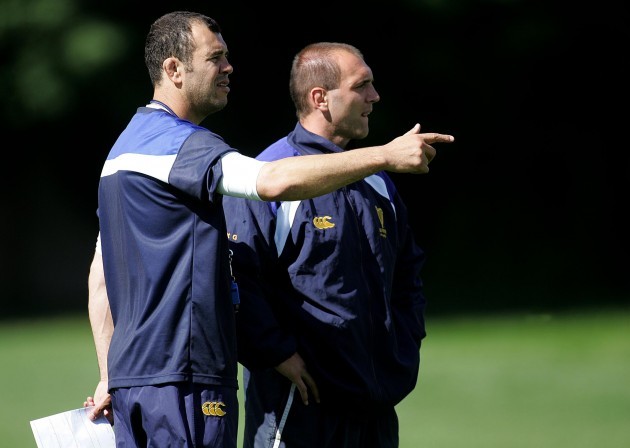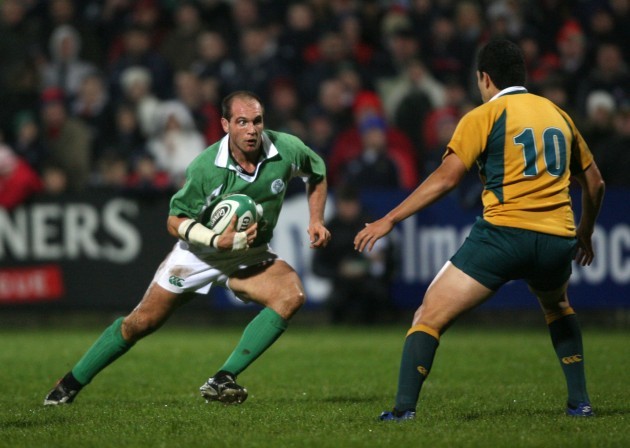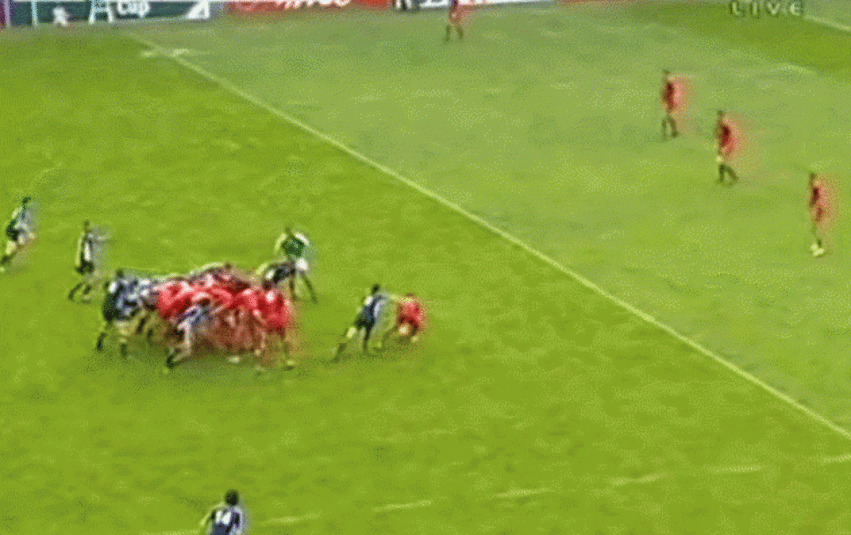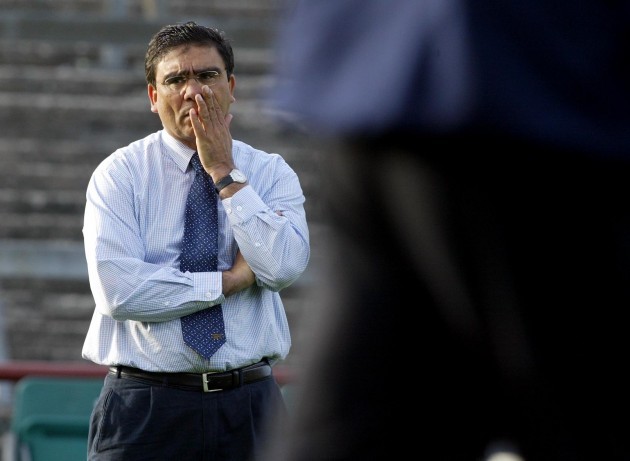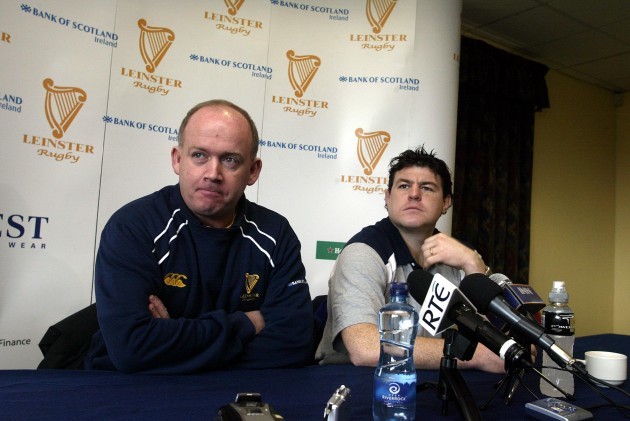‘ARE YOU TRYING to make me cry?,’ Keith Gleeson asks. The topic of discussion is Leinster’s European success since 2009 and you could forgive the former Ireland flanker if he had to dab his eyes or at least claim to be chopping onions.
The reason for Gleeson’s response is that he stepped away from professional rugby in 2008 – the worst possible time that a Leinster play could have retired.
Gleeson was an integral part of the team during his seven seasons with the province and won two Celtic League medals. But in the seven years since he left, his former team have reached a different level, winning two league titles as well as three European Cups and the Challenge Cup.
Gleeson has enjoyed seeing some former team-mates reach the summit of the club game but missing out on European glory is definitely something that he thinks about.
“It was great to see some of my friends become European champions after all the time I spent playing at the club,” Gleeson told The42.
“But of course I was bitterly disappointed that they had to go and win the Heineken Cup the year after I retired.”
Gleeson was only 32 when he returned to Australia and probably would have been Shane Jennings’ back-up on the Heineken Cup winning team in 2009 had he stuck around. In a press conference after his retirement was announced, the then coach Michael Cheika said of the decision that ‘if he ever changes his mind, he just has to lift the telephone and I’d have him back in a minute.’
But Gleeson says that an injury he suffered a few years earlier meant that his level of performance was diminishing and there was nothing he could do to halt it. He doesn’t think he could have come back during that 2008/2009 season, even if he had wanted to.
“I broke my leg badly in 2004 and it definitely curtailed my movement,” Gleeson said.
“I wasn’t the same player after that and I had reduced mobility in my ankle. I spent more time on the physio table than on the pitch. I knew I was never going to be as good as I was and if you can’t continue to improve, why do it?”
“As much as I would like to think I could have came back and played, even if you are out of professional rugby for just one year, it is really tough to come back,” he continued.
It’s an interesting thought process because often veteran players try to prolong their careers as long as possible, even when it is obvious that their bodies can no longer respond to the mind’s commands the way it once did.
But when he was fit, Gleeson was one of Leinster’s best performers and he also won 27 Ireland caps, including starting at openside flanker at the 2003 World Cup.
Throughout his time in Ireland, pundits and fans often campaigned for Gleeson’s inclusion in the Irish side on a more regular basis, due to him being an ‘out-and-out’ seven rather than a bulky bulldozer.
Gleeson gave his opinion on what being a true number seven entails.
“Richie McCaw has sort of been the flag bearer for sevens for the last few years,” he says.
“Typically you have to be fast, play a linking role between the forwards and the backs and be tough in defence. Offensively you need to be good enough to play with the backs and defensively you need to be one of the best on the pitch.”
Ireland haven’t really used a traditional number seven in the last few years, with David Wallace and Sean O’Brien playing in the position regularly. But Gleeson thinks if you tailor your back row, the lack of a true openside isn’t a big issue and uses the Irish team as an example.
“You have to build your team around the personnel that you have,” Gleeson says.
“I wouldn’t say Sean O’Brien is an out-and-out seven, he’s more of a 6.5. If you have a 6.5 at seven, then you can pick a 6.5 at six and a good number eight and that’s your back row.”
It’s no surprise that Gleeson puts defence near the top of the list of skills an openside must have because it is something that he excelled at during his career. One particular example of his quickness off the base of the scrum was in Leinster’s famous Heineken Cup quarter-final win over Toulouse in 2006.
Freddie Michalak tried to bamboozle Gleeson with a dummy-kick but ended up getting tigerishly tackled and throwing a hideous heave into Cameron Jowitt’s bread basket.
“If you get a hand on Freddie Michalak you are doing well,” Gleeson says.
“Michael Cheika had done his research and I knew that sometimes he shaped to kick and then tried to run it. I got a hand on him and he had a brain implosion and threw the ball straight to Cameron Jowitt.”
That was Michael Cheika’s first season in charge – along with David Knox as backs coach and Mike Brewer as forwards coach – and Gleeson is very complimentary of the work the trio did after the two years of turmoil following Matt Williams’ departure.
After winning a Celtic League and making a Heineken Cup semi-final under Williams, Leinster regressed significantly under Gary Ella, finishing eight in the league and failing to qualify from their Heineken Cup pool.
The following season under Declan Kidney was a little better, but it ended with Leinster receiving a home hiding from Leicester in the European Cup quarter-final.
“The next two years [after Williams] were disastrous for Leinster to be honest,” Gleeson said.
“We needed great coaches to take that team on and Gary was not in that league. We had fairly strong personalities in the dressing room but we had a weak coaching structure.”
“Then Declan Kidney came in very late before the start of the following season and we were underprepared,” he continued.
“We needed everyone to be rowing in the same direction but we didn’t have a clear game plan. There was very little progress made in those two years when we should have kicked on from the Matt Williams era.”
Gleeson is far away from professional rugby today, working as a financial planner in Sydney. The flanker thinks of his time with Leinster as ‘a long, long time ago in a galaxy far, far away’ but admits that when one his two young sons began playing mini-rugby, he got that itch to get back on the field.
He still watches rugby though, and thinks European club rugby is the most exciting form of the game. Although he also had some interesting observations on how he thinks the Irish team are progressing towards the World Cup.
“European rugby played well leaves Super Rugby for dead every time, and that is why I prefer the European Cup knockout games to anything else,” Gleeson said.
“I was a little bit disappointed by Ireland in the Six Nations. At times they played great rugby like against Scotland but often they were quite limited in the style they played. If you do that against the All Blacks and South Africa, they will kill you. You need to be more adventurous.”

